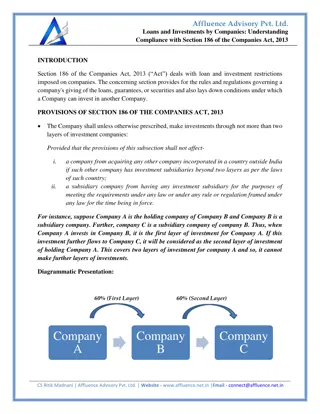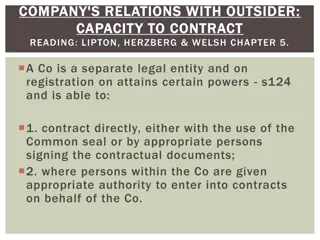Capacity Building in Company Law: Loans, Guarantees, and Investments Presentation
This webinar, conducted by CS (Dr.) D.K. Jain, covers Sections 185 to 187 of the Companies Act, 2013 related to loans, guarantees, security, and investments. It provides insights on restrictions, applicability, and implications for directors and connected persons. The content emphasizes the importance of compliance and understanding the regulations governing financial dealings within companies.
Download Presentation

Please find below an Image/Link to download the presentation.
The content on the website is provided AS IS for your information and personal use only. It may not be sold, licensed, or shared on other websites without obtaining consent from the author. Download presentation by click this link. If you encounter any issues during the download, it is possible that the publisher has removed the file from their server.
E N D
Presentation Transcript
Webinar Series of WIRC of ICSI on Capacity Building Come Back to Profession Presentation on 9th April, 2021 on Loans, Guarantees, Security and Investments in Securities [Section 185 to 187 of the Companies Act, 2013] By CS (Dr.) D.K. JAIN Practising Company Secretary Insolvency Professional & Registered Valuer (SFA)
Contents Section 185 - Loans to Directors or to a person connected with a Director Section 186 - Making loans, Investments, Providing Guarantee or Security Section 187 - Investments in Property, Securities of Other Assets to held in its Own Name
Disclaimer No part of this presentation is intended for providing professional advice, or solicitation of professional assignment and its purely for the purpose of sharing and exchange of knowledge The information contained in this presentation is indented solely for the use of individual or entity to whom it is addressed, and others authorised to receive it. If you or an unintended recipient, please notify us immediately by responding to this e-mail and then delete it from your system. This is a knowledge resource of CS (Dr.) D. K. Jain, the presentation and discussion thereon during the lecture is do not ensuring the accuracy, completeness and we do not take responsibility to make any updation thereon subsequently to participants. - Any action based on content in this presentation shall be at the sole risk, responsibility and liability of individual taking such action and this presentation and the WIRC of ICSI or their team expressly disclaim any and all liability from any harm, loss or damage, including without limitation, indirect, consequential, special, incidental or punitive damages resulting from or caused due to your reliance and action or inaction on the basis of this presentation. - -
Restrictions on Providing Loan, Guarantee & Security Applicability: Section 185 is applicable to a public company as well as a private company. Restrictions on Providing Loan to a Director or to a Person Connected with a Director Section 185(1) as substituted w.e.f. 7-5-2018, provides that no company directly or indirectly shall: (a) advance any loan to; or (b) any loan represented by a book debt; or (c) give any guarantee; or (d) provide any security in connection with any loan taken by: (i) any director of company, or of a company which is its holding company or any partner or relative of any such director; or (ii)any firm in which any such director or relative is a partner. In respect of a book debt it has been said that "If it can be said of a debt arising in the course of a business and due to or growing due to the proprietor of that business that such a debt would or could in the ordinary course of such a business be entered in the well kept-books relating to that business, the debt can properly be called a book-debt, whether it is in fact entered in the books of the business or not. Paul & Frank Ltd. v Discount Bank Overseas Ltd. (1967) 37 Comp Cas 76 (Ch.D): (1966) 2 All ER 922: (1967) 1 Comp LJ 56]
Meaning of any Other Person in Whom Director is Interest Section 185 applies to the Loans, etc. Given by a Company 'directly or indirectly' Indirect loan means that the company shall not give a loan through the agency of one or more intermediaries, the word 'indirectly' in the section cannot be read as converting what is not a loan into a loan. As such, a debt, which is not in the nature of loan cannot be said to be the case of an indirect loan. [Fredie Ardeshir Mehta (Dr.) v Union of India (1989) 2 CLA 244 (Bom): (1991) 70 Comp Cas 210 (Bom): (1991) 1 Comp LJ 437 (Bom)] Meaning of any person in whom any of the Director of the Company is Interested Explanation of 185(1) says that for the purposes of section 185, the expression any person in whom any of the director of the company is interested means: (a)any private company of which any such director is a director or member; (b)any body corporate at a GM of which not less than 25% of the total voting power may be exercised or controlled by any such director, or by two or more such directors, together; or (c)any body corporate, the BOD, MD or manager, whereof is accustomed to act in accordance with the directions or instructions of the Board, or of any director or directors, of the lending company.
Interpretation of Certain Transactions Credit sale of Immovable Assets is out of Purview of Section 185 It has ben held that Flat sold to director, part amount in cash, balance amount in credit. Credit sale not to be treated as loan. Bombay HC held, that this will not attract provisions of Section 295 (Now section 185 of the Companies Act, 2013). Credit sales cannot be described as an indirect loan but, disclosure at and approval of Board meeting is necessary. [Fredie Ardeshir Mehta (Dr.) v Union of India (1989) 2 CLA 244 (Bom): (1991) 70 Comp Cas 210 (Bom): (1991) 1 Comp LJ 437 (Bom)] Restrictions Apply only at the Time of Entering into the Transaction The section 185 is applicable only at the time of granting the loan and any change in circumstances thereafter will not make the section applicable. Thus, section 185 will not be attracted in respect of a loan given to an employee, who does not fall within the ambit of specified persons as listed above, but who subsequently becomes a member of the Board, because at the time of the loan, no contravention was involved. If the private limited company has given loan/guarantee or security provided to any of the person, if the loan/guarantee given or security provided was earlier exempted from the provisions of section 185 it will continue to be exempted. However, it cannot give further loan without complying with the provisions of section 185.
Interpretation of Certain Transactions Whether Covered u/s 185 Directors of Companies are Advised that they should not Expose Themselves and the Companies of which they are Directors by Providing Security/Guarantee The MCA is of the view that the action of the director in furnishing the company's surety to an outsider (i.e. one not connected with the company's administrative structure) is ultra vires the company. The directors of companies are hence advised that they should not expose themselves and the companies of which they are directors to the risk of standing sureties in the circumstances described for accused persons. By doing so the director may be held personally liable for having acted outside the scope of the company's authority and in a manner prejudicial to the interests of the companies concerned. [Source: Circular No. 37/75 (F. No. 14/5/74-CL.V), dated 17 January, 1976] Instances Relating to Loans to Concerns in which Directors are Interested A public company advanced a large sum free of interest to one of its directors and his relative. It was asked to explain the irregularity. In its explanation the company contended that the advances were made to these persons in connection with the company's business, as in their capacity as employees of the company, they were required to purchase stores, spare parts, etc. on behalf of the company and to incur expenses on traveling on company's business. It appeared that all such advances could hardly be considered as having been made for the purposes of the business of the company as the amount involved was large and remained unadjusted for quite a long time.
Interpretation of Certain Transactions Whether Covered u/s 185 Indirect Loan Seven bodies corporate belonging to the group had formed two private limited companies and had made loans to these two companies. These two companies had in their turn lent funds to a partnership firm owned by the principal members of the group. The composition of the BOD of the private companies was so arranged that the loans from the companies would not attract the provisions of section 185. By this device, the provisions of section 185 were cleverly circumvented. A direct loan from the public companies to the partnership firm would have attracted section 185.
Permissible Loan, Guarantee or Security Taken by Any Person in Whom Director is Interest Permissible Loan to a Person Connected with a Director [Section 185(2)] A company may advance any loan including any loan represented by a book debt, or give any guarantee or provide any security in connection with any loan taken by any person in whom any of the director of the company is interested, subject to the condition that (a)a special resolution is passed by the company in GM: Provided that the explanatory statement to the notice for the relevant GM shall disclose the full particulars of the loans made, or guarantee given, or security provided and the purpose for which the loan or guarantee or security is proposed to be utilised by the recipient of the loan or guarantee or security and any other relevant fact; and (b) the loans are utilised by the borrowing company for its principal business activities.
Transactions Exempted from Section 185(1) and (2) Certain Loans not Covered/Exempted u/s 185 [Section 185(3)] Provides that nothing contained in this sub-section shall apply to (a) the giving of any loan to a MD or WTD (i) as a part of the conditions of service extended by the company to all its employees; or (ii) pursuant to any scheme approved by the members by a special resolution; or (b) a company which in the ordinary course of its business provides loans or gives guarantees or securities for the due repayment of any loan and in respect of such loans an interest is charged at a rate not less than the rate of prevailing yield of 1/3/5/10 year Govt. security closest to the tenor of the loan; or (c) any loan made by a holding company to its WOS company, or any guarantee given, or security provided by a holding company in respect of any loan made to its WOS company; or (d) any guarantee given or security provided by a holding company in respect of loan made by any bank or financial institution to its subsidiary company: Provided that the loans made under clauses (c) and (d) are utilised by the subsidiary company for its principal business activities.
Exemptions Granted to Certain Company from Section 185 Exemptions to a Private Company [Notification No. GSR 464(E), dated 05.06.2015] Has provided exemption from section 185 to a private company and has specified that the section 185 shall not apply to a private company (a) in whose share capital no other body corporate has invested any money; or (b) if the borrowings of such a company from banks or FIs or any body corporate is less than twice of its paid up share capital or Rs.50 crore, whichever is lower; or (c) such a company has no default in repayment of such borrowings subsisting at the time of making transactions under this section. Exemption to a Nidhi Company [Notification No. GSR 465(E), dated 05.06.2015] Has provided exemption from section 185 to a Nidhi company and has specified that section 185 shall not apply to a Nidhi company for the loan given to a director or his relative in their capacity as members and such transaction is disclosed in the annual accounts by a note. Exemption to a Govt. Company [Notification No. GSR 463(E), dated 05.06.2015] Has provided exemption from section 185 to a Govt. company and has specified that section 185 shall not apply to a Govt. company in case such company obtains approval of the Ministry or Department of the Central Govt. which is administratively in charge of the company, or, as the case may be, the State Govt. before making any loan or giving any guarantee or providing any security u/s 185.
Fine on Contravention of Section 185 Fine for Contravention [Section 185(4) w.e.f. 7-5-2018] If any loan is advanced or a guarantee or security is given or provided in contravention of section 185(1), the company shall be punishable with fine Minimum Rs. 5 Lakhs Maximum Rs. 25 Lakhs; director or the other person to whom any loan is advanced or guarantee or security is given or provided in connection with any loan taken by him shall be punishable with imprisonment upto 6 months or with fine Minim Rs.5 Lakhs- Maximum Rs. 25 lakh, or with both. Every officer of the Company who is in default shall be punishable with imprisonment for a term upto 6 months or with fine Minimum Rs.5.00 Lakhs- Maximum Rs. 25 lakhs. Compounding of offence [section 441] The offence committed under this section is compoundable in accordance with the provisions of the Act. Compounding of offence u/s 185 of Companies Act, 2013 Where the offence u/s 295 of CA- 1956 (Corresponding to section 185) has been committed but there is no willful default and no malafide intention petitioner is entitled for compounding of offence. [KPR Agrochemicals Ltd. 2016 (135) CLA 226 NCLT.]
Other Requirements under Schedule III Disclosures Need to be given in the Financial Statements, etc. As prescribed under Schedule III to the Act, a company is required to make the following disclosures separately: (a) Long term Loans and advances due by directors or other officers of the company or any of them either severally or jointly with any other persons or amounts due by firms or private companies respectively in which any director is partner of a director or a member should be stated separately. (b) Short term Loans and advances due by directors or other officers of the company or any of them either severally or jointly with any other persons or amounts due by firms or private companies respectively in which any director is partner of a director or a member should be stated separately.
Secretarial Checklist for Compliance of Section 185 Check whether provisions contained in section 185 of the Act are applicable. If not, check whether: 1.Any loan has been made to: (a) any director of the lending company; (b) any director of the holding company; (c) any partner of any such director; (d) any relative of any such director; (e) any firm in which any such director is a partner; (f) any firm in which a relative of such director is a partner; (g) any private company of which any such director is a director or member; (h) any body corporate of which not less than 25% of the total voting power is exercised or controlled at a GM by any director, or by two or more directors together; (i) any body corporate, the BOD, MD or manager whereof is accustomed to act in accordance with the directions or instructions of the Board, or of any director or directors of the lending company; 2. Provisions of sections 179, 186 and 188 are complied with, if applicable; 3. Necessary entries are made in the Register of Loans; 4. Special Resolution if required have been passed and Form MGT-14 is filed with the ROC 5. The requisite resolutions are recorded in the minutes of Board/Committee meeting, etc.
Some Important Definition u/s 186 Meaning of certain Terms for the purpose of Section 186 Meaning of freereserves Means those reserves which, as per the latest audited balance sheet, are free for distribution as dividend and shall include balance to the credit of the securities premium account but shall not include share application money. Meaning of "Body Corporate" The word used in the section is Bodycorporate and not the Company . Body Corporate means as defined u/s 2(11) of the Act. It is inclusive definition. Section 2(11) defines 'body corporate or corporation includes a company incorporated outside India, but does not include (i) a co-operative society registered under any law relating to co-operative societies; and (ii) any other body corporate (not being a company as defined in this Act), which the Central Govt. may, by notification, specify in this behalf; The term "body corporate" is wider than the expression "company" and is used in several sections of the Act to denote not only a company incorporated in India but also a foreign company. It includes a corporation formed under any special law of India or a foreign country, except as expressly excluded by the definition. It includes all PFI as well as nationalised banks. However, it excludes a body corporate, which is not a company under the Act and which is specified by the Central Govt.. [Vibank Housing Finance Ltd., In re (2006) 130 Comp Cas 705 (Karn)]
Some Important Definition for the Purpose of Section 186 Meaning of Securities The word used in the section is Securities , it means as defined under SCRA, 1956. It is a wide definition and covers also, bond, debenture, warrants, script, or any other marketable securities and also derivatives and right and interest in the securities. In this context, it can be inferred that warrant/ instrument convertible into shares also comes under the net of section 186. Investment in Mutual Fund issued by the Trusts are Not Security Investment in Mutual Fund and Govt. Securities falls outside section 186 as the same are not issued by body corporate. Most of the mutual funds are constituted as Trust under Indian Trust Act. Such trusts are not body corporate. However, investments in units of UTI Mutual Fund which are issued by UTI Trust Company Pvt. Ltd. and investment in unit of UTI set up u/s 3 of Unit Trust of India Act, 1963 is covered u/s 186. Meaning of investmentcompany [w.e.f. 7-5-2018] Means a company whose principal business is the acquisition of shares, debentures or other securities and a company will be deemed to be principally engaged in the business of acquisition of shares, debentures or other securities, if its assets in the form of investment in shares, debentures or other securities constitute not less than 50% of its total assets, or if its income derived from investment business constitutes not less than 50% as a proportion of its gross income.
Some Important Definition for the Purpose of Section 186 Purchase of Property for some Purposes of its Utilization is not Investment The purchase of property for some purpose other than the receipt of income is not an investment. [Power's Will Trust Public Trustee v Hastings 1947 2 All ER 282; Wragg, In re (1919) 2 Ch 58] Meaning of business of financing companies [Section 186(11)(2) Rule 11(2)] business of financing industrial enterprises shall include, with regard to a NBFC registered with RBI, business of giving of any loan to a person or providing any guarantee or security for due repayment of any loan availed by any person in the ordinary course of its business.
Meaning of Infrastructure Company u/s 186 Meaning of Infrastructurefacilities Infrastructurefacilities means the facilities specified in Schedule VI as under. (1) Transportation (including inter modal transportation), includes the following: (a) roads, national highways, state highways, major district roads, other district roads and village roads, including toll roads, bridges, highways, road transport providers and other road-related services; (b) rail system, rail transport providers, metro rail roads and other railway related services; (c) ports (including minor ports and harbours), inland waterways, coastal shipping including shipping lines and other port related services; (d) aviation, including airports, heliports, airlines and other airport related services; (e) logistics services. (2) Agriculture, including the following, namely: (a) infrastructure related to storage facilities; (b) construction relating to projects involving agro-processing and supply of inputs to agriculture; (c) construction for preservation and storage of processed agro-products, perishable goods such as fruits, vegetables and flowers including testing facilities for quality.
Meaning of Infrastructure Company u/s 186 Meaning of Infrastructurefacilities (3) Water management, including the following, namely: (a) water supply or distribution; (b) irrigation; (c) water treatment. (4) Telecommunication, including the following, namely: (a) basic or cellular, including radio paging; (b) domestic satellite service (i.e., satellite owned and operated by an Indian company for providing telecommunication service); (c) network of trunking, broadband network and internet services. (5) Industrial, commercial and social development and maintenance, including : (a) real estate development, including an industrial park or special economic zone; (b) tourism, including hotels, convention centres and entertainment centres; (c) public markets and buildings, trade fair, convention, exhibition, cultural centres, sports and recreation infrastructure, public gardens and parks; (d) construction of educational institutions and hospitals; (e) other urban development, including solid waste management systems, sanitation and sewerage systems.
Meaning of Infrastructure Company u/s 186 Meaning of Infrastructurefacilities (6) Power, including the following: (a) generation of power through thermal, hydro, nuclear, fossil fuel, wind & other renewable sources; (b) transmission, distribution or trading of power by laying a network of new transmission or distribution lines. (7) Petroleum and natural gas, including the following: (a) exploration and production; (b) import terminals; (c) liquefaction and re-gasification; (d) storage terminals; (e) transmission networks and distribution networks including city gas infrastructure. (8) Housing, including the following: (a) urban and rural housing including public/mass housing, slum rehabilitation, etc; (b) other allied activities such as drainage, lighting, laying of roads, sanitation and facilities.
Meaning of Infrastructure Company u/s 186 Meaning of Infrastructurefacilities (9) Other miscellaneous facilities/services, including the following: (a) mining and related activities; (b) technology related infrastructure; (c) manufacturing of components and materials or any other utilities or facilities required by the infrastructure sector like energy saving devices and metering devices; (d) environment related infrastructure; (e) disaster management services; (f) preservation of monuments and icons; (g) emergency services (including medical, police, fire and rescue). (10) such other facility service as may be prescribed. Meaning of Investment 'Investment' means investment in the securities of any other body corporate, which includes shares, debentures, convertible debentures, warrants, bonds, etc. as defined under the SEBI Act, 1992 and the Securities Contract (Regulation) Act, 1956.
Restrictions on Investment through not more than 2 layers Restrictions on making Investment through not more than 2 Layers [Section 186(1)] Without prejudice to the provisions contained in the Companies Act, 2013 a company shall unless otherwise prescribed, make investment through not more than 2 layers of investment companies: Provided that the provisions section 186(1) shall not affect, (i) a company from acquiring any other company incorporated in a country outside India if such other company has investment subsidiaries beyond 2 layers as per the laws of such country; (ii) a subsidiary company from having any investment subsidiary for the purposes of meeting the requirements under any law or under any rule or regulation framed under any law for the time being in force. Exemption to Specified IFSC Companies [Notification No. GSR 8(E) and 9(E), dated 04.01.2017] The Central Govt. has exempted the applicability of section 186(1) to the Specified IFSC Public and Private company.
Restrictions on Providing Loan, Investments, Guarantee & Security Restriction on Providing Loans, Guarantee and investment to other Body Corporate or Person [Section 186(2)] No company shall directly or indirectly (a) give any loan to any person or other body corporate; (b) give any guarantee or provide security in connection with a loan to any other body corporate or person; and (c) acquire by way of subscription, purchase or otherwise, the securities of any other body corporate, exceeding 60% of its paid-up share capital, free reserves and securities premium account or 100% of its free reserves and securities premium account, whichever is more. The Explanation to section 185(1) w.e.f. 7-5-2018, provides that the word "person" does not include any individual who is in the employment of the company. Exemption to IFSC Company [Notification No. GSR 8(E) and 9(E), dated 04.01.2017] Section 186(2) shall not apply to Specified IFSC Public & Private company, if a company passes a resolution either at meeting of the BOD or by circulation.
Exemptions from the Limits as Prescribed u/s 186(3) Exemptions from the Limits Prescribed u/s 186(3) [Rule 11(1)] Where a loan or guarantee is given or where a security has been provided by a company to; its WOS company; or a joint venture company, or acquisition is made by a holding company, by way of subscription, purchase or otherwise of, the securities of its WOS company, the requirement of section 186(3) shall not apply: Provided that the company shall disclose the details of such loans or guarantee or security or acquisition in the financial statement as provided u/s 186(4). Exemptions to a Gov. Company [Notification No. GSR 463(E), 05.06. 2015] Has provided exemptions from section 186 to a Govt. company and has provided that section 186 shall not apply to (a) a Govt. company engaged in defence production; (b) a Govt. company, other than a listed company, in case such company obtains approval of the Ministry or Department of the Central Govt. which is administratively in charge of the company, or, as the case may be, the State Govt. before making any loan or giving any guarantee or providing any security or making any investment under the section.
Powers of the Board u/s 186 Powers of the Board shall be Exercised only at their Meeting by way of a Circulation of Resolution The BOD of a company has the following powers: (a) to make loans to any body corporate; (b) to give any guarantee, or provide security to any person in connection with a loan made by that person to any body corporate; and (c) to subscribe or purchase the securities of any other body corporate. (d) Whenever there is a proposal before a company to make loan or investment or to give guarantee or provide security, each such proposal upto the overall limit stated above (or in excess of the limit after approval by company in GM) will be considered and approved by the BOD of the company at a meeting of the Board by way of a resolution of the draft resolution with agenda which shall be passed with the consent of all the directors present at the meeting. Limitation on the Powers of the Board The BOD of a company can approve the above said proposals only upto 60% of the paid up capital and free reserves or 100% of the free reserves of the company, whichever is more. The said limit applies either to loans, investments or guarantee/security individually or to all the above transactions put together.
Requirements for Seeking Approval of Member u/s 186 Approval of Shareholders is Necessary where the BOD needs to make Investment in excess of the Prescribed Limits [Section 186(3) w.e.f. 7-5-2018] Where the aggregate of the loans and investments so far made, the amount for which guarantee or security so far provided to or in all other bodies corporate along with the investment, loan, guarantee or security proposed to be made or given by the Board, exceed the limits of 60% or 100%, referred to above, no investment or loan shall be made or guarantee shall be given or security shall be provided unless previously authorised by a special resolution passed in a GM. Exemptions to the IFSC Company [Notification No. GSR 8(E) & 9(E), dated 04.01.2017] Section 186(3) shall not apply to Specified IFSC Public & Private Company, if a company passes a resolution either at meeting of the BOD or by circulation.
Disclosure needs to be made u/s 186 Disclosure requirement in the Financial Statements [Section 186(4)] The company shall disclose to the members in the financial statement the full particulars of the loans given, investment made or guarantee given or security provided and the purpose for which the loan or guarantee or security is proposed to be utilised by the recipient of the loan or guarantee or security. Disclosure requirements in the Notice of GM [Section 186(4)] The notice of the GM for passing Special Resolution shall indicate clearly the following: (i) the limits that will be required in excess of the prescribed limits involved in the proposal; (ii) the particulars of the body corporate in which the investment is proposed to be made or to which the loan or guarantee or security proposed to be given; (iii) the purpose of the investment, loan, guarantee or security; (iv) the sources of funding for meeting the proposal; and (v) other details as may be specified.
Disclosure needs to be made u/s 186 No Blanket permission will be given by the shareholders [Circular No. 8/99, 4-6-1999] A blanket permission of the shareholders empowering the Board to make loans or investments or to give guarantee or security upto a certain aggregate limit will not be adequate compliance with the provisions issued by the MCA, stating, inter alia, that en-block approval should be avoided (except in the case of guarantee where the resolution can indicate an amount on annual basis). The said circular is quoted below which is self-explanatory: (i) The companies are expected to obtain the approval for making investments into securities or grant of loan to other companies of amounts, which are linked with company's available financial resources and the resolution for investment much beyond the net worth should not be passed by the companies. (ii) The companies should specifically indicate in the explanatory statement to the resolution, the specific securities in which it is proposed to invest the amount. En-block approval should normally be avoided (except in the case of guarantee where resolution can indicate an amount on annual basis). If above broad parameters are not complied, the government will be constrained to take suitable action against those who contravene these. A resolution passed at a GM in terms of section 186(3) may specify the total amount up to which the BOD is authorised to give guarantee.
Other Requirements needs to be Complied u/s 186 Unanimous consent of all the directors at the Board meeting is required [Section 186(5)] No investment shall be made or loan or guarantee or security given by the company unless the resolution sanctioning it is passed at a meeting of the Board with the consent of all the directors present at the meeting and the prior approval of the PFI concerned where any term loan is subsisting, is obtained: No requirement for prior approval of PFI within the limits subject to no default of repayment of loans and interest thereon [The proviso of section 186(5)] Prior approval of a PFI shall not be required where the aggregate of the loans and investments so far made, the amount for which guarantee or security so far provided to or in all other bodies corporate, along with the investments, loans, guarantee or security proposed to be made or given does not exceed the limits of 60% of its paid-up share capital, free reserves and securities premium or 100% of its free reserves and securities premium account, whichever is more and there is no default in repayment of loan instalments or payment of interest thereon as per terms and conditions of such loan to the PFI. Board Resolution for Specified IFSC companies [Notification No. GSR 8(E) & 9(E), 04.01.2017] In case of a Specified IFSC public and private company, the Board can exercise powers u/s 186 by means of resolutions passed at meetings of the BOD or through resolutions passed by circulation
Restrictions on the Powers of the Board u/s 186 Restriction on taking loan on the companies registered with SEBI u/s 12 of the SEBI Act Section 186(6) provides that no company, which is registered u/s 12 of the SEBI Act, 1992 and covered under such class or classes of companies as may be prescribed, shall take inter-corporate loan or deposits exceeding the prescribed limit and such company shall furnish in its financial statement the details of the loan or deposits. Restriction on providing loans on lower rate of interest payable on the Loans [Sec. 186(7)] No loan shall be given under this section at a rate of interest lower than the prevailing yield of 1 year, 3 year, 5 year or 10 year Govt. Security closest to the tenor of the loan. The MCA by General Circular No. 6/2015, dated 9th April, 2015 has clarified thatin cases where the effective yield (effective rate of return) on tax free bonds is greater than the prevailing yield of 1/3/5/10, Govt. Security closest to the tenor of the loan, there is no violation of 186(7). Exemption to a Govt. Company [proviso to section 186(7) w.e.f. 13.06. 2017] Nothing contained section 186(7) shall apply to a company in which 26% or more of the paid-up share capital is held by the Central Govt. or one or more State Govt. or both, in respect of loans provided by such company for funding Industrial Research and Development projects in furtherance of its objects as stated in its MOA. Restriction on providing loan, guarantee or security in case of default Committed [Section 186(8)] No company which is in default in the repayment of any deposits accepted or in payment of interest thereon, shall give any loan or give any guarantee or provide any security or make an acquisition till such default is subsisting.
Register of Loans, Investments, Guarantee or Security Register of Loans, Investment, Guarantee or Scurity Provided by the Company [Sec.186(9) Rule 12(1)] Every company giving loan or giving a guarantee or providing security or making an acquisition of securities shall, maintain a register in the Form MBP-2 and enter therein separately, the particulars of loans and guarantees given, securities provided and acquisitions made as aforesaid. Entries to be made in the register within 7 days [Rule 12(2)] Entries in the register shall be made chronologically in respect of each such transaction within 7 days of making such loan or giving guarantee or providing security or making acquisition. Place of keeping and preservation of the Register [Rule 12(3)] The register shall be kept at the regd. office. The register shall be preserved permanently and shall be kept in the custody of the CS of the company or any other person authorised by the Board for the purpose. Authentication of the Register [Rule 12(4)] The entries in the register [either manual or electronic] shall be authenticated by the CS of the company or by any other person authorized by the Board. Inspection of the Register Shall be kept at the regd. office and (a) shall be open to inspection at such office; and (b) extracts may be taken there from by any member, and copies thereof may be furnished to any member of the company on payment of such fees not exceed Rs.10 for each page.
Exemptions from Applicability of Section 186 Exemption for the Applicability of Section 186 [Section 186(11) w.e.f. 7-5-2018] Provides that nothing contained in this section, except Section 186(1), shall apply (a)to any loan made, any guarantee given or any security provided or any investment made by a banking company, or an insurance company, or a housing finance company in the ordinary course of its business, or a company established with the object of and engaged in the business of financing industrial enterprises, or of providing infrastructural facilities; (b)to any investment (i) made by an investment company; (ii) made in shares allotted in pursuance of section 62(1)(a) or in shares allotted in pursuance of rights issues made by a body corporate; (iii)made in respect of investment or lending activities, by a NBFC registered with RBI and whose principal business is acquisition of securities. Fine u/s 186 [Section 186(13)] If a company contravenes the provisions of this section, the company shall be punishable with fine Minimum Rs.25,000 maximum Rs.5 Lakhs and every officer of the company who is in default shall be punishable with imprisonment for a term which may extend to 2 years and with fine which shall Minimum Rs. 25,000 Maximum Rs.1 lakh.
Investments in Property, Securities of Other Assets to held in its Own Name Investments in property, security or other assets to be held in its own name [Section 187(1)] All investments made or held by a company in any property, security or other asset shall be made and held by it in its own name: However, Shares held by the company in its subsidiary may be held in the names of the nominees to ensure compliance of the minimum number of members Exemptions from the requirement of Section 187 [Section 187(2)] Nothing in the section 187 shall be deemed to prevent a company (a) from depositing with a bank, being the bankers of the company, any shares or securities for the collection of any dividend or interest payable thereon; or (b) from depositing with, or transferring to, or holding in the name of, the SBI or a scheduled bank, being the bankers of the company, shares or securities, in order to facilitate the transfer thereof: Provided that if within a period of six months from the date on which the shares or securities are transferred, as soon as practicable after the expiry of that period, have the shares or securities re-transferred to it from the SBI or the scheduled bank or, as the case may be, again hold the shares or securities in its own name; or (c) from depositing with, or transferring to, any person any shares or securities, by way of security for repayment of any loan advanced to company or the performance of any obligation undertaken by it; (d) from holding investments in the name of a depository as a beneficial owner.
Investments in Property, Securities of Other Assets to held in its Own Name Register of Investments made by a company and not held by it in its own name [Section 187(3) Rule 14(1)] Where in pursuance of section 187(2)(d), any shares or securities in which investments have been made by a company are not held by it in its own name, the company shall maintain a as prescribed in the Form MBP-3 and shall be open to inspection by any member or debenture-holder without any charge during business hours subject to such reasonable restrictions as the company may by its AOA or in GM impose. Every company shall, from the date of its registration, maintain a register in Form MBP-3 and enter therein, chronologically, the particulars of investments in shares or other securities beneficially held by the company but which are not held in its own name. The company shall also record the reasons for not holding the investments in its own name and the relationship or contract under which the investment is held in the name of any other person. Further, the company shall also record whether such investments are held in a third party s name for the time being or otherwise. [Rule 14(2)]
Investments in Property, Securities of Other Assets to held in its Own Name Register shall be kept at the Registered office and its Authentication [Rule 14(4)] The register shall be maintained at the registered office of the company. The register shall be preserved permanently and shall be kept in the custody of the CS of the company or if there is no CS, any director or any other officer authorised by the Board for the purpose. [Rule 14(3)] Entries in the register shall be authenticated by the CS of the company or by any other person authorized by the Board for the purpose. Penalty for contravention of section 187 [Section 187(4) w.e.f. 21-12-2020] If a company is in default in complying with the provisions of this section, the company shall be liable to a penalty of Rs. 5 lakh and every officer of the company who is in default shall be liable to a penalty of Rs. 50,000.
Thanks for your interest and appreciation CS (Dr.) D.K. Jain Cell; 9425062039 Email: dkjain@dkjaincs.com




























